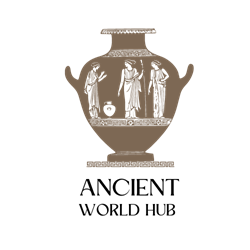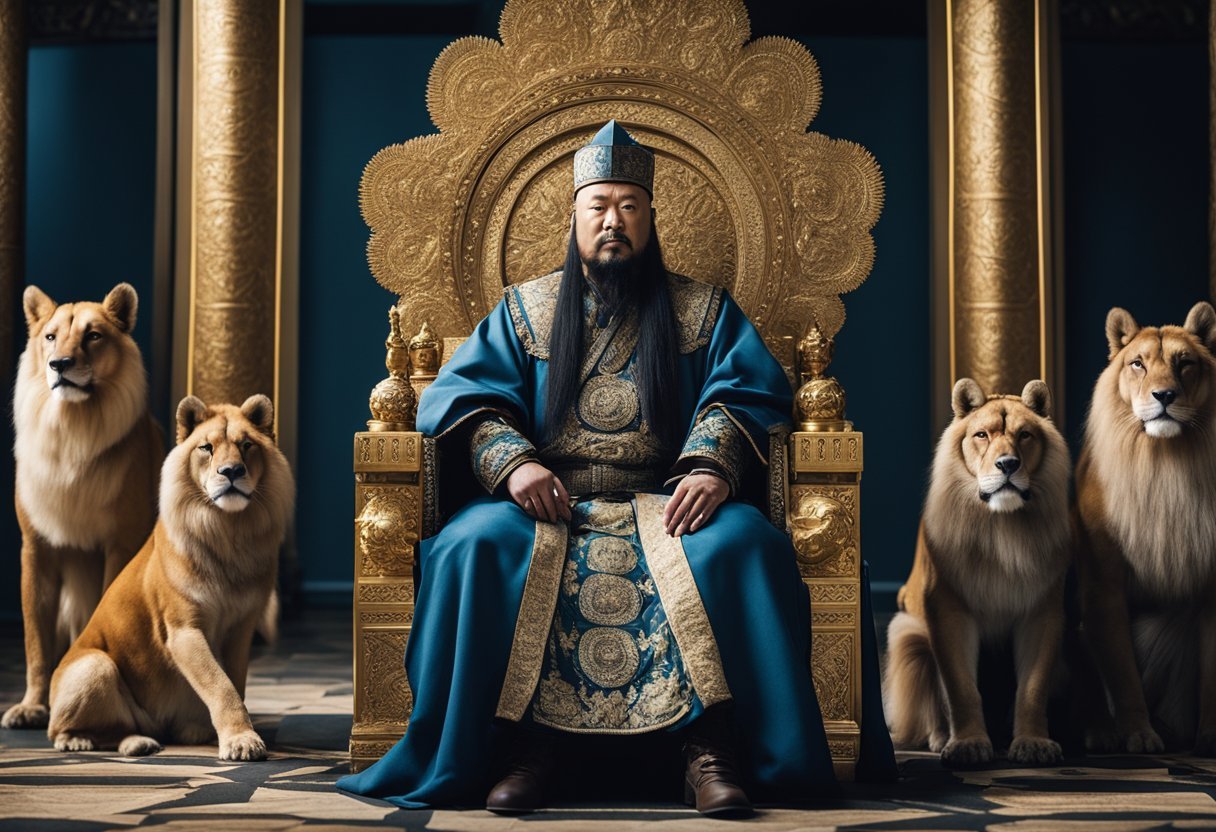Kublai Khan, born in 1215, was a pivotal figure in world history as the founder and first emperor of the Yuan dynasty in China. He’s best known for completing the Mongol conquest of China in 1279, a task begun by his grandfather, Genghis Khan. Under his rule, the Mongol Empire was the largest contiguous empire in history, stretching from the Caspian Sea to the East China Sea.
As the fifth emperor of the Mongol Empire, Kublai Khan’s rule was marked by significant achievements, including the establishment of the Great Yuan dynasty in 1271. He proved to be a skilled statesman, adept at managing the vast territories of his empire and integrating diverse cultures under his reign. His encounter with Marco Polo, the famous Venetian explorer, further immortalized his legacy and brought tales of the exotic East to Europe.
Kublai’s lineage was equally impressive. He was the second son of Tolui and Sorghaghtani Beki, further enriching his credentials with a blend of strong leadership and shrewd diplomacy inherited from his family. Kublai did not merely inherit an empire; he expanded and consolidated it, making the Yuan dynasty a significant chapter in Chinese history.
Rise to Power

Kublai Khan’s journey to becoming the ruler of the Yuan dynasty was marked by a strong family lineage, strategic maneuvers to secure the throne, and decisive actions to consolidate his power.
Early Life and Family Background
Kublai Khan was born on September 23, 1215, into a powerful family. His father was Tolui, the fourth son of the great conqueror Genghis Khan. His mother, Sorghaghtani Beki, played a crucial role in shaping him and his siblings into capable leaders.
Growing up, Kublai witnessed the expansion of the Mongol Empire and was influenced by its military and political strategies. He had a multicultural upbringing, being exposed to various traditions and philosophies. This exposure helped him understand the diverse peoples within the empire and later aided in his diplomatic endeavors.
Claim to the Throne
The path to power wasn’t straightforward for Kublai Khan. His elder brother Mongke’s ascent to the throne in 1251 positioned Kublai as an essential figure in the Mongol Empire. Mongke appointed Kublai as the viceroy of northern China, where he showcased his administrative skills and ambition.
Mongke’s death in 1259 sparked a power struggle. Kublai’s main rival was his younger brother, Ariq Böke. The ensuing civil war, known as the Toluid Civil War, lasted for years, with Kublai eventually emerging victorious. By 1264, Kublai had solidified his claim to leadership, gaining the loyalty of key Mongol factions and military leaders.
Consolidation of Power
After securing the throne, Kublai focused on stabilizing and expanding his rule. In 1271, he proclaimed the establishment of the Yuan dynasty, marking a significant shift from traditional Mongol governance to a more Sinicized administration. This move aimed to integrate and legitimize his rule over China.
Kublai undertook significant reforms, including centralizing the government, improving tax collection, and promoting trade and cultural exchange along the Silk Road. He also invested in infrastructure projects, such as the extension of the Grand Canal, enhancing the empire’s connectivity. These actions helped Kublai maintain control and fostered prosperity across his vast empire.
Reign and Legacy

Kublai Khan’s reign saw the expansion of the Mongol Empire and the establishment of the Yuan Dynasty in China. His rule led to significant administrative changes, cultural growth, and economic development, leaving a lasting impact on the region.
Expansion of the Empire
Kublai Khan continued the efforts of his predecessors, expanding the Mongol Empire to its greatest extent. He successfully completed the conquest of China, started by Genghis Khan. By 1279, Kublai’s army defeated the Southern Song Dynasty, bringing all of China under Mongol control.
He also led expeditions into Southeast Asia and attempted invasions of Japan, though they were unsuccessful. Kublai’s expansion wasn’t solely driven by military conquest but also by establishing trade networks that connected Asia, Europe, and Africa.
Administrative Policies
Kublai Khan implemented numerous administrative reforms to consolidate his rule over the vast territories. He adopted many Chinese political and cultural practices, which helped legitimize his rule among the Chinese populace.
He established a centralized bureaucracy and used scholars, including foreign advisors like Marco Polo, to build an efficient administration. Kublai introduced paper currency to streamline the economy and built infrastructure, including roads and canals, to facilitate trade and communication.
Cultural and Economic Impact
Kublai Khan’s reign marked a period of significant cultural and economic exchange. His court became a melting pot of different cultures, attracting merchants, artists, and scholars from across the world. This cultural blending brought innovations in art, science, and technology.
Economically, Kublai promoted commerce by protecting merchants and establishing important trade routes. The Silk Road thrived during his reign, allowing the exchange of goods and ideas. Foreign trade flourished, bringing in wealth and fostering relationships with distant lands.
Death and Succession
Kublai Khan began to withdraw from active rule after the deaths of his favorite wife, Chabi, in 1281, and his eldest son in 1285. His reliance on alcohol and food led to health issues. He passed away on February 18, 1294.
After his death, the Yuan Dynasty continued under his grandsons but eventually faced internal strife and rebellion. The dynasty ultimately fell in 1368, but Kublai’s impact on the socio-political landscape of China and the Mongol Empire endured for centuries.

